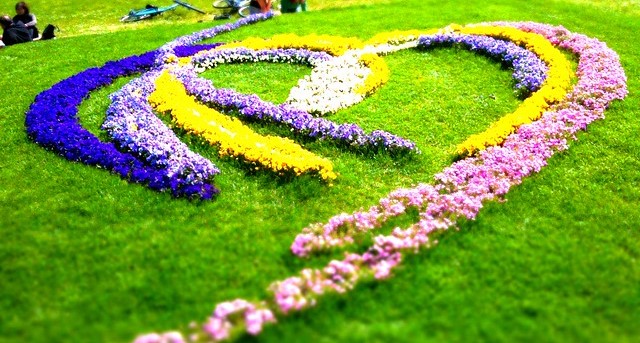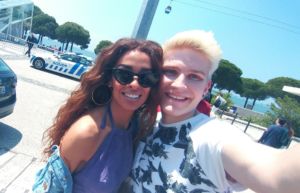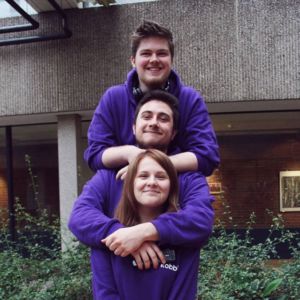‘I would trade Christmas for Eurovision’
-
 Photo: Farruska via Flickr (cc)
Photo: Farruska via Flickr (cc)
You might not notice it, but for some students this week is very important. Clothes are picked, snacks prepared, playlists made. It's Eurovision week, and the fans have been anticipating it for months. 'I watch it on three screens at once.'
For those who are not at all interested in confetti, glitter and slightly hysterical music, here are the facts. This week, in Tel Aviv (wait, but that’s not Europe!), the Eurovision Song Contest takes place. Forty-one countries compete, and the finals are tomorrow night. And some of the international students at Radboud University are preparing themselves for this big moment.
Florian Kühnert (20), Psychology, from Germany
‘Germany has an intimate relationship with the last place’

‘Here in Nijmegen, I don’t know many people who are as into Eurovision as I am. I would trade Christmas for it. The whole week, I am wearing bracelets from last year’s contest, in Lisbon. I went there and it was just amazing. The show itself is pretty focused on television, so the nicest thing about going to Lisbon was visiting the Eurovision village. There’s a stage where the artist perform, a food court, and you can meet all the artists. They really take the time to talk to you. I met Mikolas Josef, for example, and sang the chorus of his song with him. And Netta, last year’s winner.
In Lisbon, I met people that I still talk to online. With a Belgian girl I met there, I went to Eurovision in Concert in Amsterdam. I also went to Melodifestivalen in Sweden, the festival where the Swedes pick which song to send in. That was great, Swedes are really extra.
This Saturday, I will be watching in café ThomTom. Within the gay community, Eurovision is quite a big thing. Back in Germany, I always watched it with my family, screaming until I lost my voice. This year, I am actually supporting The Netherlands. Not because of the country, but because the song fits the music I usually listen to. I also like Malta’s song Chameleon. The German song this year is not good, and it hasn’t been good for years. We won in 2010, but ever since then we had a very intimate relationship with the last place.’
Florian’s favourite for the finals:
Dimitar Dimitrov (19), Artificial Intelligence, from Bulgaria
‘The weirder, the better’
‘Eurovision brings countries and people together. That’s what I like about it. That is also why I did not like Salvador Sobral as a winner in 2017, because in interviews he talked other singers down. Even Netta, the Israeli singer who went on to win the year after him. That made me quite happy. I danced to her song Toy yesterday on the game Just Dance. I have a Nintendo Switch that I can bring to university. We just find an empty room and hook it up to the screen.

Unfortunately, Bulgaria is not competing this year, because it couldn’t pay the entrance fee. It is nice when you hear your culture in a song. I was surprised to see that not many people here watch Eurovision and there aren’t many screenings. So I make my friends come over to my house, and watch it with me. Back at home, my best friend and I had a whole ritual. We go out to dinner first, and buy snacks and then watch it on three screens, just in case the connection on one of them fails. This year, I will be in touch with her through Discord, a chat programme for gamers. That way, we can still watch it together.
Personally, I prefer the weirder songs over the ballads. We are going to hear generic pop songs on the radio anyway, so for Eurovision, it can be a bit bizarre. One of my favourites is Iceland, it stands out, and is super political, but they did study ABBA’s Waterloo for the key changes in the song. I also like The Netherlands and Cyprus. But it does not matter who wins, really. People remember the good, weird songs. Not the winner.’
Dimitar’s favourite for the finals:
Ismene Kilia (24), Tourism and Culture, from Greece
‘The music becomes more and more important’
‘I watched the first semi-finals with everybody in my flat at Hoogeveldt. It was a very international group, there were people from Bulgaria, Croatia, Greece, Sweden, and some more countries. Back when I was a child, Eurovision was all about watching with friends and family. This year, I listened to all the songs beforehand with a friend. It is never amazingly good music, it’s just peculiar and fun, almost feels from a different era.

The song I liked best was from Portugal, but I guess that was too experimental for many people, because they did not make it to the finals. Australia was great too, when I watched it, I thought: “is this even Eurovision?” It was innovative, almost trippy. And San Marino, of course. What the… was that? It was so bad, but the older man singing it was so adorable. The reason I am extra excited this year, is that I actually like the song from my own country, Greece. Their performance is based on a Jheronimus Bosch painting, did you know that? I am supporting them now that Portugal did not make it.
It seems that in the past few years, it is less about countries liking each other, and more and more about the music. Before, Greece and Cyprus always gave each other twelve points, just like Belgium and The Netherlands did that. But last year, The Netherlands did not award Belgium any points. And in 2015, Cyprus did not give Greece 12 points. Actually, now that I think about it, some people did feel a little betrayed by that.’
Ismene’s favourite for the finals:



